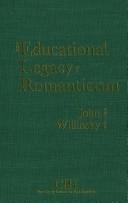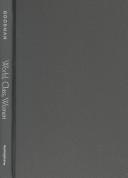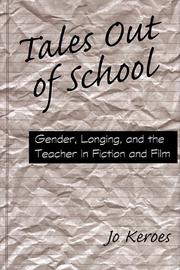| Listing 1 - 10 of 13 | << page >> |
Sort by
|

ISBN: 0889209960 9786613810939 1554586178 128223319X 0889205558 9780889205550 Year: 2006 Publisher: Waterloo Wilfrid Laurier University Press
Abstract | Keywords | Export | Availability | Bookmark
 Loading...
Loading...Choose an application
- Reference Manager
- EndNote
- RefWorks (Direct export to RefWorks)
Papers of a conference held at the Calgary Institute of the Humanities, Oct. 13-18, 1988.
Education in literature --- Education --- Romanticism --- Congresses. --- Philosophy --- Schools in literature
Book
ISBN: 1474497373 1474497365 1474497349 Year: 2023 Publisher: Edinburgh : Edinburgh University Press Ltd,
Abstract | Keywords | Export | Availability | Bookmark
 Loading...
Loading...Choose an application
- Reference Manager
- EndNote
- RefWorks (Direct export to RefWorks)
This volume brings together leading critical voices from a range of disciplines to examine the complex and profoundly significant ways in which female literary artists interrogated and advanced educational philosophy and practice. The volume recreates the plurality and non-linearity of the conversations and forms of literary expression that took place in and through this body of educational writing. Literature and education in the long eighteenth-century share certain perceived aims: the transmission of knowledge, strengthening of understanding, acculturation, and sometimes empowerment. They also share structural forms: lessons; conversations; letters; dramatizations; confessions; narratives; imitations; sometimes fantasies. In the long eighteenth-century, authors of literary texts were often authors of educational treatises who saw their activities in both spheres as interrelated. As such, the parties of teacher and pupil, author and reader frequently overlap. This book provides a historically sensitive understanding of the fraught relations between these parties, drawing attention to the period's debates about authority and freedom as they relate to matters of gender, race, religion, age, and class. This project provides a nuanced understanding of women's literary contributions to the period's strands of educational thought, enabling us to better understand the many and complicated ways in which authors and readers of the period envisaged that literary texts might fulfil, fail, or refuse to fulfil, educational functions.
Education in literature. --- Education --- Women --- History --- EDUCATION / History. --- 1700-1799 --- Education.
Book
ISBN: 0810132001 9780810132009 9780810132016 Year: 2015 Publisher: Evanston, Illinois
Abstract | Keywords | Export | Availability | Bookmark
 Loading...
Loading...Choose an application
- Reference Manager
- EndNote
- RefWorks (Direct export to RefWorks)
"In one of the first English studies of Thomas Bernhard, Fatima Naqvi focuses on the Austrian author's critique of education (Bildung) through the edifices in which it takes place. His writings insist that learning has always been a life-long process that is helped--or hindered--by the particular buildings in which Bildung occurs. Naqvi offers close readings of Bernhard's major prose works, from Amras (1964) to Old Masters (1985) and brings them into dialogue with major architectural debates of the times. She examines Bernard's interrogation of the theoretical foundations underpinning the educational system and its actual sites. How We Learn Where We Live opens new avenues into thinking about one of the most provocative writers of the twentieth century"--
Book
ISBN: 1282190490 9786612190490 1443806633 9781443806633 9781847189936 1847189938 9781282190498 6612190493 Year: 2008 Publisher: Newcastle, UK Cambridge Scholars
Abstract | Keywords | Export | Availability | Bookmark
 Loading...
Loading...Choose an application
- Reference Manager
- EndNote
- RefWorks (Direct export to RefWorks)
The "Schoolhouse Gothic," undertaken by insiders and outsiders to the academy alike and embodied both in literature and in academic discourse, draws on Gothic metaphors and themes in representing and interrogating contemporary American schools and educators. Curses from the past take the form of persistent power inequities (of race, gender, class, and age) and, rather ironically, the very Enlightenment that was to save the moderns from rigid, ancient, mystified hierarchies. In Schoolhouse Got...
Book
ISBN: 1108266142 1108242103 110827160X 1108416861 9781108271608 9781108242103 1108403360 9781108403368 9781108416863 9781108403368 Year: 2018 Publisher: Cambridge New York
Abstract | Keywords | Export | Availability | Bookmark
 Loading...
Loading...Choose an application
- Reference Manager
- EndNote
- RefWorks (Direct export to RefWorks)
Anglo-Saxons valued education yet understood how precarious it could be, alternately bolstered and undermined by fear, desire, and memory. They praised their teachers in official writing, but composed and translated scenes of instruction that revealed the emotional and cognitive complexity of learning. Irina Dumitrescu explores how early medieval writers used fictional representations of education to explore the relationship between teacher and student. These texts hint at the challenges of teaching and learning: curiosity, pride, forgetfulness, inattention, and despair. Still, these difficulties are understood to be part of the dynamic process of pedagogy, not simply a sign of its failure. The book demonstrates the enduring concern of Anglo-Saxon authors with learning throughout Old English and Latin poems, hagiographies, histories, and schoolbooks.
English literature --- Education in literature. --- Teachers in literature. --- Civilization, Anglo-Saxon, in literature. --- Schools in literature --- History and criticism. --- Great Britain --- History

ISBN: 113400074X 0203465598 1280242213 9786610242214 9780203465592 0415944902 0415944910 9781134000692 9781134000739 9781134000746 9780415944908 9780415944915 1134000731 9781280242212 6610242216 Year: 2004 Publisher: New York RoutledgeFalmer
Abstract | Keywords | Export | Availability | Bookmark
 Loading...
Loading...Choose an application
- Reference Manager
- EndNote
- RefWorks (Direct export to RefWorks)
This book addresses how current debates about education could make a contribution to feminist thought.
Feminism and education. --- Feminism in literature. --- Education in literature. --- Schools in literature --- Feminist theory in literature --- Education and feminism --- Education --- Sociology of the family. Sociology of sexuality --- Teaching --- Educational sciences --- Fiction --- Feminism --- Literature --- Theory --- Book

ISBN: 0585128685 9780585128689 0809322382 9780809322381 Year: 1999 Publisher: Carbondale Southern Illinois University Press
Abstract | Keywords | Export | Availability | Bookmark
 Loading...
Loading...Choose an application
- Reference Manager
- EndNote
- RefWorks (Direct export to RefWorks)
Jo Keroes's scope is wide: she examines the teacher as represented in fiction and film in works ranging from the twelfth-century letters of Abelard and Heloise to contemporary films such as Dangerous Minds and Educating Rita. And from the twelfth through the twentieth century, Keroes shows, the teaching encounter is essentially erotic. Tracing the roots of eros from cultural as well as psychological perspectives, Keroes defines erotic in terms broader than the merely sexual. She analyzes ways in which teachers serve as convenient figures on whom to map conflicts about gender, power, and desire. To show how portrayals of men and women differ, even in situations that are very much alike, she examines pairs of texts, using a film or a novel with a woman protagonist (Up the Down Staircase, for example) as counterpoint to one featuring a male teacher (Blackboard Jungle) or The Prime of Miss Jean Brodie balanced against Dead Poets Society.
American fiction --- Teacher-student relationships in literature. --- English fiction --- Gender identity in literature. --- Teachers in motion pictures. --- Education in literature. --- Authority in literature. --- Teachers in literature. --- Desire in literature. --- Teachers --- Gender identity in motion pictures. --- Desire in literature --- Gender identity in motion pictures --- Teacher-student relationships in literature --- Gender identity in literature --- Teachers in motion pictures --- Education in literature --- Authority in literature --- Teachers in literature --- American Literature --- English --- Languages & Literatures --- English literature --- Schools in literature --- Teachers in moving-pictures --- Motion pictures --- Faculty (Education) --- Instructors --- School teachers --- Schoolteachers --- School employees --- American literature --- History and criticism. --- History and criticism
Book
ISBN: 1438467249 9781438467245 9781438467238 1438467230 Year: 2017 Publisher: Albany, New York : Sunny Press,
Abstract | Keywords | Export | Availability | Bookmark
 Loading...
Loading...Choose an application
- Reference Manager
- EndNote
- RefWorks (Direct export to RefWorks)
Jewish American immigrants and their children have been stereotyped as exceptional educational achievers, with attendance at prestigious universities leading directly to professional success. In College Bound, Dan Shiffman uses literary accounts to show that American Jews' relationship with education was in fact far more complex. Jews expected book learning to bring personal fulfillment and self-transformation, but the reality of public schools and universities often fell short. Shiffman examines a wide range of novels and autobiographies by first- and second-generation writers, including Abraham Cahan, Mary Antin, Anzia Yezierska, Elizabeth Gertrude Stern, Ludwig Lewisohn, Marcus Eli Ravage, Lionel Trilling, and Leo Rosten. Their visions of learning as a process of critical questioning—enlivening the mind, interrogating cultural standards, and confronting social injustices—present a valuable challenge to today's emphasis on narrowly measurable outcomes of student achievement.
American literature --- Education in literature. --- Education --- Children --- Education, Primitive --- Education of children --- Human resource development --- Instruction --- Pedagogy --- Schooling --- Students --- Youth --- Civilization --- Learning and scholarship --- Mental discipline --- Schools --- Teaching --- Training --- Schools in literature --- English literature --- Agrarians (Group of writers) --- Jewish authors --- History and criticism.
Book
ISBN: 9780803255111 080325511X 9780803245051 080324505X 9780803255128 9780803255135 0803255136 0803255128 1306674506 Year: 2014 Publisher: Lincoln
Abstract | Keywords | Export | Availability | Bookmark
 Loading...
Loading...Choose an application
- Reference Manager
- EndNote
- RefWorks (Direct export to RefWorks)
"Study of French education and republicanism as represented in twenty-first century French literature and film"-- "French school debates of recent years, which are simultaneously debates about the French Republic's identity and values, have generated a spate of internationally successful literature and film on the topic of education. While mainstream media and scholarly essays tend to treat these works as faithful representations of classroom reality, The Pedagogical Imagination takes a different approach. In this study of French education and republicanism as represented in twenty-first-century French literature and film, Leon Sachs shifts our attention from "what" literature and film say about education to "how" they say it. He argues that the most important literary and filmic treatments of French education in recent years--the works of Agnes Varda, Érik Orsenna, Abdellatif Kechiche, Francois Begaudeau--do more than merely depict the present-day school crisis. They explore questions of education through experiments with form. The Pedagogical Imagination shows how such techniques engage present-day readers and viewers in acts of interpretation that reproduce pedagogical principles of active, experiential learning--principles at the core of late nineteenth-century educational reform that became vehicles for the diffusion of republican ideology. "--
LITERARY CRITICISM / European / French. --- EDUCATION / Evaluation. --- PERFORMING ARTS / Film & Video / History & Criticism. --- Motion pictures --- Republicanism in literature. --- Education in motion pictures. --- Education in literature. --- French literature --- Cinema --- Feature films --- Films --- Movies --- Moving-pictures --- Audio-visual materials --- Mass media --- Performing arts --- Schools in literature --- History --- History and criticism. --- History and criticism
Book
ISSN: 18621112 ISBN: 9783110301977 3110301970 1299723543 3110303183 9783110303186 Year: 2013 Volume: Bd. 111 Publisher: Berlin De Gruyter
Abstract | Keywords | Export | Availability | Bookmark
 Loading...
Loading...Choose an application
- Reference Manager
- EndNote
- RefWorks (Direct export to RefWorks)
Antike Bildungskonzepte werden in jüngerer Zeit intensiv erforscht. Dieser Band lenkt den Blick auf die Spätantike und den lateinischen Westen des Römischen Reiches. In den Saturnalia wendet sich Macrobius an seinen Sohn, um ihm Wissenswertes zu vermitteln. Untersucht wird, um welche Informationen es sich dabei handelt und wofür sie nützlich sind. Dazu werden auch der Entstehungskontext und die literarische Form der Saturnalia bestimmt und gedeutet. Aus den Briefen des Sidonius Apollinaris lässt sich ebenfalls ein Konzept von Bildung ableiten. Zwar lassen sich weniger konkrete Bildungsinhalte erschließen, dafür bieten die Briefe wertvolle Einblicke in das Verständnis und die Wertschätzung von Bildung im Gallien des 5. Jahrhunderts. Martianus Capellas De nuptiis Philologiae et Mercurii gilt als erste Enzyklopädie. Das Werk ist aufgrund seines Entstehungskontextes und seiner außergewöhnlichen literarischen Form von besonderem Interesse für die Untersuchung. Ausgehend von der Interpretation dieser drei Autoren wird ein Konzept der Bildungsvorstellungen im 5. Jh. n. Chr. entworfen, das Inhalte und Traditionen gleichermaßen aufgreift und Träger von Bildung sowie deren Einstellungen gegenüber Bildung aufzeigt.
Late oudheid. --- Vorming. --- Macrobius, --- Martianus Capella, --- Sidonius Apollinaris, C. Sollius Modestus, --- Latin literature --- Education in literature --- Education, Ancient --- Languages & Literatures --- Greek & Latin Languages & Literatures --- History and criticism --- Education in literature. --- Education --- Schools in literature --- History and criticism. --- History --- Macrobius, Ambrosius Aurelius Theodosius --- Martianus Capella --- Sidonius Apollinaris, --- Apollinaire, Sidoine, --- Apollinare, Sidonio, --- Apollinarīĭ Sidonīĭ, K. S., --- Apollinaris Sidonius, Caius Sollius, --- Gaius Sollius Apollinaris Sidonius, --- Gayo Solio Modesto Apolinar Sidonio, --- Sidoine Apollinaire, --- Sidoni Apol·linar, --- Sidonīĭ, K. S. Apollinarīĭ, --- Sidonio Apolinar, --- Sidonio Apollinare, --- Capella, Martianus --- Martianus Mineus Felix Capella Afer Carthaginensis --- Marziano Capella --- Macrobe --- Criticism and interpretation. --- Macrobio --- Macrobio, Ambrogio Teodosio --- Macrobius, Aur. Theodosius --- Macrobius, Aurelius Theodosius --- Macrobius Theodosius, Ambrosius --- Theodosius, Ambrosius Macrobius --- Marciano Mineo Félix Capela --- Capela, Marciano Mineo Félix --- Sidonius Apollinaris --- Late antiquity. --- Macrobius. --- Martianus Capella. --- Sidonius Apollinaris. --- learning.
| Listing 1 - 10 of 13 | << page >> |
Sort by
|

 Search
Search Feedback
Feedback About UniCat
About UniCat  Help
Help News
News